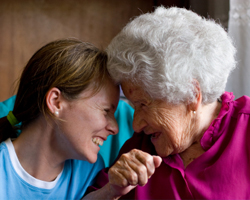Collaborating in the Care of Michigan's Aging Community
- Jeffrey Dwyer, Ph.D.
- Professor
- Department of Family Medicine
- Associate Dean for Research and Community Engagement
- College of Human Medicine
Training current and future generations of healthcare workers to care for Michigan's elderly is an urgent need. The Geriatric Education Center of Michigan (GECM)External link - opens in new window is a statewide consortium specifically funded to address this need. Jeffrey Dwyer, Associate Dean for Research and Community Engagement in MSU's College of Human MedicineExternal link - opens in new window, directs the Center, which is administratively based at Michigan State University.
Since 1987, the GECM has coordinated the efforts of a number of institutions across Michigan to promote the health and well-being of senior citizens. In 2007, with a new vision and a grant from the federal Health Resources and Services Administration (HRSA), Dr. Dwyer led the GECM in establishing interdisciplinary teams of healthcare professionals in eight key regions across the state. The teams, composed of medical professionals and MSU Extension agents, formulated a new way of coordinating geriatric care that is both targeted and flexible. They work collaboratively with various regional organizations to assess the unique geriatric needs of each region, complete 40 hours of related interdisciplinary training, and then provide 12 hours of training to at least 15 other local health care professionals.

The response so far has been extremely positive. In October 2009, the initial training event in the Grand Rapids region attracted 240 health care professionals, 133 of whom signed up to complete additional training. Suzann Oglund-Hand, team leader in the Grand Rapids region and Director of the Center for Senior Care at Pine Rest Christian Mental Health ServicesExternal link - opens in new window, says "We are thrilled to be collaborating on this training grant—with a focus on creating networks of professionals who will be able to provide more informed services to elders and their families in Michigan."
The strength of the GECM program is in its approach, which Dwyer says "respects [the fact] that the communities these teams represent are very different, as is the makeup of the teams. It's not a cookie-cutter approach." With a solid foundation of MSU health care professionals, Extension agents, and community health care leaders, along with flexible training options, and outcomes that are transforming geriatric training across Michigan, the GECM is succeeding even in the midst of some tough challenges. For example, the economy has caused some institutions to lose funding for this type of training. In spite of this, many health care workers have remained committed to the program, even at personal expense.
Dwyer has been constantly impressed with the teams' work—and teamwork. Though he modestly claims that he's "just the coach and cheerleader," his skill at building relationships has helped these teams accomplish more in a shorter period of time than he ever expected. "For me," says Dwyer, "the key is that it's always about the relationships."
- Written by Amy Byle, University Outreach and Engagement